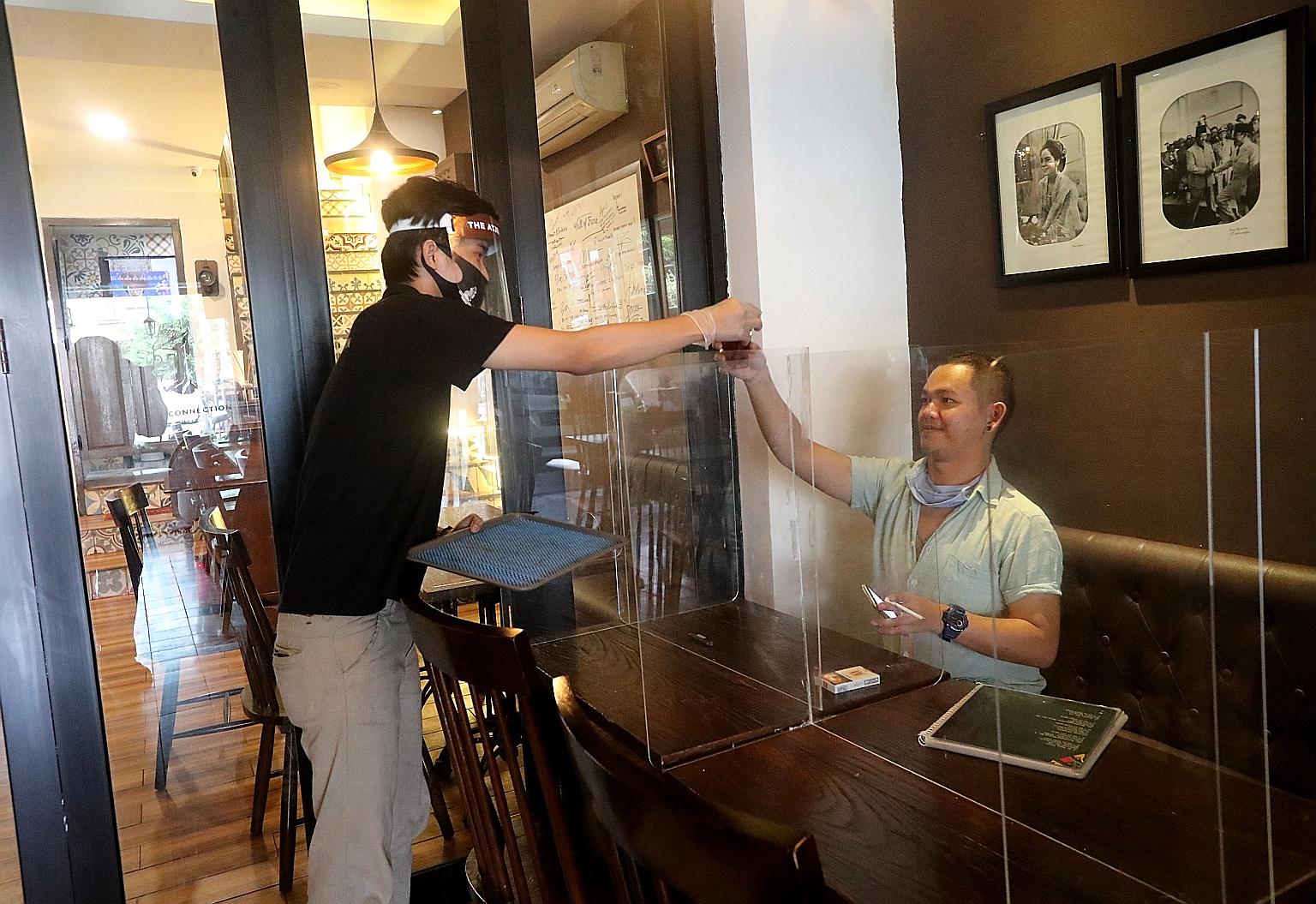Coronavirus pandemic: Indonesia
Safety measures in place as Jakarta reopens slowly
Sign up now: Get insights on Asia's fast-moving developments

An employee in protective gear delivering a drink to a customer in an eatery in Jakarta on Thursday. The Indonesian capital's efforts to reopen its economy come as the rates of infection both in Jakarta and across the country appear to be accelerating. President Joko Widodo has warned that the social distancing restrictions will snap back if infections jump.
PHOTO: EPA-EFE
Restaurants at 50 per cent capacity, a ban on talking on the MRT trains and stiff fines for anyone caught without a mask - these are among measures Jakarta is introducing as it reopens slowly.
A little more than two weeks after Indonesian President Joko Widodo girded his countrymen to prepare to "co-exist" with the coronavirus, businesses are cautiously unwinding restrictions that slowed the outbreak in the country's biggest cities.
The philosophy guiding the effort, after three months of near total lockdown, may be "easy does it".
Jakarta Governor Anies Baswedan this week announced that the city's 80 or so shopping malls that serve as air-conditioned family getaways for many will finally open on Monday. Gyms, playgrounds and movie theatres will need to wait.
And while Transport Minister Budi Karya Sumadi has lifted rules capping the number of passengers on commuter trains and ferries, which were previously set at 50 per cent, Jakarta's MRT is still limiting its carriages to a little more than a quarter of the 250 passengers that they can take.
A strict no-talking policy on the MRT will also be in effect to help curb the spread of the virus.
"During this time, ridership is not the single objective," MRT Jakarta's president director William Sabandar told The Straits Times.
Ridership has recovered to 20,000 a day now - about a fifth of the pre-pandemic daily average but up from the 5,000 or so per day during Jakarta's lockdown, which officially started on April 7.
"We need a rebranding of public transport to show that we are safe," said Mr Sabandar.
At the Union Group, which runs 17 upper-end restaurants across Jakarta, they are holding off on opening for now, even though city regulations say they can open outlets that are housed in stand-alone buildings - and not malls.
The company has just over 1,000 staff on reduced wages.
But reconfiguring dining rooms to comply with the minimum 1m space between tables, sorting through menus, scheduling and digesting contact tracing requirements mean doors have to remain closed, said Ms Stefanie Wijono, deputy director of marketing and public relations. "We are starting slow, but in a few weeks, we will be ready."
But Jakarta's efforts to reopen its economy come as the rates of infection both in the capital and across the country appear to be accelerating. On Wednesday, Indonesia reported more than 1,240 new cases - a record since the first cases emerged on March 2. The country has recorded more than 36,000 cases and over 2,000 deaths.
During the seven days to June 11, infections in the capital alone averaged 136. There were fewer than 100 a week earlier.
Mr Joko has warned that the social distancing restrictions will snap back if infections jump. Late last month, he said the military would help enforce mask wearing and social distancing in public places.
In Jakarta, anyone caught not wearing a mask risks a fine of 250,000 rupiah (S$25), a day's wages for some here.
"From experiences we have seen elsewhere, we don't want to go through the process of opening up only to close down again," Mr Aaron Seeto, director of the Museum Macan, told The Straits Times.
The contemporary art museum, which opened in 2017 to great fanfare, is rethinking exhibits and activities, and introducing timed ticketing and other measures to mitigate the spread of the virus. The museum is holding off on announcing when it will reopen. "We are happy to go slow," said Mr Seeto.
Mr Sibarani Sofian, founder of architecture firm Urban+, which is consulting on the planning for Indonesia's new, as yet unnamed, capital, said construction work may be delayed. The designs may need to allow more space for offices and public spaces, he said.
"Usually, we need 9 sq m to 12 sq m per person for office space. That may double. We may need to rethink the appropriate amount of space," he added.
Ms Wijono of Union Group said she is looking forward to some semblance of normalcy and getting back into a dining room.
"Being in a restaurant or a bar and seeing all the cogs move and being in the midst of a crowd, I miss that the most," she said.


